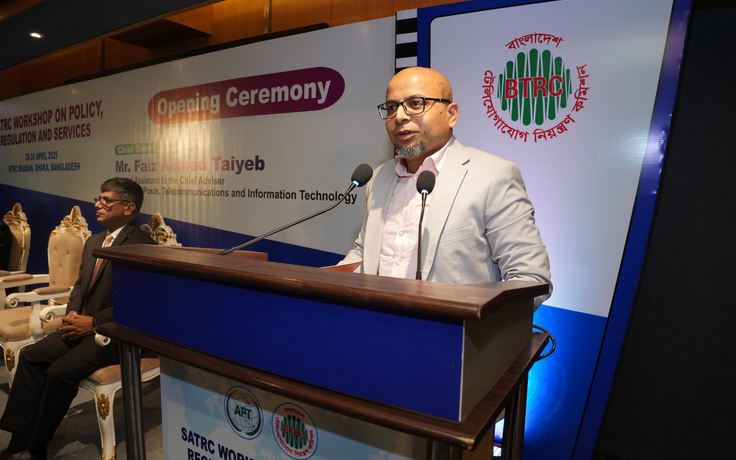News Flash
News Flash

DHAKA, April 28, 2025 (BSS) - A three-day workshop on policy, regulation and services began here today with the participation of South Asian telecommunications regulators.
Special Assistant to the Chief Adviser on Ministry of Posts, Telecommunications and Information Technology Faiz Ahmad Taiyeb inaugurated the workshop as chief guest, organized by Bangladesh Telecommunication Regulatory Commission (BTRC) at its office.
Around 200 representatives of telecommunications and information technology regulatory agencies, telecom operators, officials of government and private organizations, and telecom and information technology experts of host Bangladesh, India, Pakistan, Sri Lanka, Nepal, Bhutan, Afghanistan, Maldives and Iran are participating in the workshop.
The Asia Pacific Telecommunication Community (APTC) associate member organizations, include Huawei Technologies (China), Amazon India, Internet Society Asia Limited (Singapore) and Cullen International (Belgium), are also taking part.
With BTRC Chairman Major Gen Md. Emdad-ul-Bari (retd) in the chair, APTC Secretary General Masanori Kondo and Member of Pakistan Telecommunication Authority and Chairman of South Asian Telecommunication Regulatory Council (SATRC) Workshop on Policy, Regulation and Services Dr Khawar Siddique Khokhar joined the event as special guests.
Speaking on the occasion, Faiz Ahmad Taiyeb highlighted that with rapid technological advancements, countries across South Asia are facing similar challenges, as the telecom sector, in particular, is undergoing significant changes, accompanied by rising security concerns.
He emphasized achieving digital transformation requires a strong focus on delivering high-quality customer service and digital solutions, especially in South Asia, where regulatory hurdles are often more complex than in the West.
Taiyeb further noted that inclusivity remains a key challenge in the digital journey, saying to address this, it's essential to identify the specific obstacles and explore opportunities.
He stressed that collaborative policy development is crucial and there is no substitute for working together to create effective and inclusive frameworks.
Masanori Kondo said goal of the workshop is to facilitate the exchange of insights, experiences, and best practices among member countries. This will allow regulatory agencies to discuss key challenges, identify opportunities, and explore potential developments, all of which will contribute to the formulation of better regulations and policies for member nations, he added.
APTC Secretary General expressed his gratitude to BTRC for organizing the event so efficiently.
Dr Khawar Siddique Khokhar telecommunication services play a vital role in social and economic development and are essential for a country.
Collaborative efforts are needed among all stakeholders to ensure affordable and quality services for the consumers, he added.
Emdad-ul-Bari said countries in the region are embracing technologies such as 5G, Artificial Intelligence, and the Internet of Things, while also enhancing digital infrastructure and strengthening consumer protection. He emphasized that if these efforts are carried out through regional cooperation rather than in isolation, they will significantly accelerate national progress.
He also noted like its neighbouring countries, Bangladesh has made substantial strides in expanding mobile coverage, digitalizing services, and fostering financial inclusion through digital platforms.
Bari expressed optimism that the exchange of experiences and knowledge gained from the challenges and successes shared during the workshop will play a key role in collectively shaping the future path forward.
The sessions on the first day of the three-day workshop discussed the challenges faced by regulatory agencies in the field of fixed and mobile broadband in the era of future emerging technologies, appropriate use of the Universal Service Regulation Fund for digital inclusion, recommendations, strategies and impacts, and progress in regulating ICT e-waste management for sustainable development.
On the second day, experts will share their views in various sessions on Digital Consumer Protection: Addressing the Challenges of Online Scams and Financial Fraud; Shaping Future Tariff Policy: Analyzing the Impact of Convergence and Emerging Telecom/ICT Services in the South Asian Region; Smart Cities and Societies: Experiences and Case Studies in South Asian Countries in Deploying IoT, Big Data and Similar Technologies.
On the final day, net neutrality in developing countries: challenges, opportunities and policy directions; digital transformation in countries under the South Asian regulatory bodies will be discussed.
The SATRC was established in 1997 by the South Asian telecommunications regulatory bodies.
This body is responsible for coordinating radio spectrum, standardization, regulatory trends, telecommunications sector development strategies, and for regional cooperation and international issues of importance in telecommunications.
Various workshops and symposiums, including the council's conference, are held every year on important issues of interest to member countries.